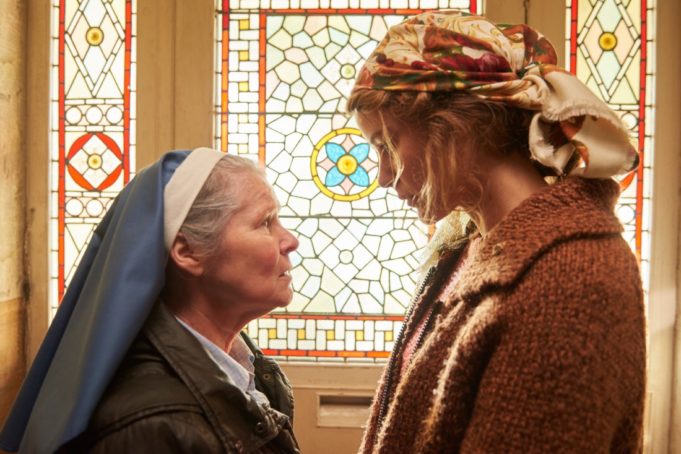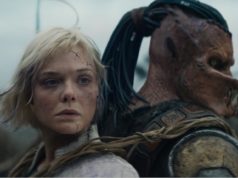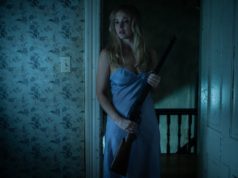Nowhere have women film directors made such an impact as in horror movies. Of course, women have now directed great films in every genre, but consider Jennifer Kent’s The Babadook, Karyn Kusama’s Jennifer’s Body, Julia Ducournau’s Raw, Coralie Fargeat’s Revenge, Ana Lily Amirpour’s A Girl Walks Home Alone at Night, Sophia Takal’s Always Shine, Stewart Thorndike’s Lyle, and just two weeks ago, Natalie Erika James’ Relic. All of these are movies told specifically from a woman’s point of view, and would be at least greatly diminished otherwise. Maybe someday I’ll figure out what all this means, but for now, Amulet comes to the Premiere Cinemas in Burleson and streaming services this weekend, and it’s worth adding to the list, thanks to some moments that made me want to curl up into a big ball and hide under my bed.
The film begins with Tomaz (Alec Secăreanu), a tormented ex-soldier from a war-torn Eastern European nation who is now an undocumented day laborer in London. We don’t immediately know what’s eating him, but we do know a chilling detail: He’s so afraid of himself that he duct-tapes his own wrists together every night before he goes to bed. One night, after running away from the police, he passes out from hunger and fatigue in front of an Anglican nun (Imelda Staunton) who gets him medical care and sets him up with a job working for a woman named Magda (Carla Juri). In exchange for room and board, he fixes up her house, which is in terrible shape. Magda can’t look after the place because she’s busy caring for her elderly mother (Anah Ruddin), who is sequestered on the top floor, whence Tomaz hears the most alarming noises and sees Magda emerge with fresh bruises and bite marks. The man has his demons, but the loathsome, white, writhing, wrinkled thing upstairs may just be a stronger one.
This is the first feature written or directed by Romola Garai, the beauteous 37-year-old actress you may have seen in I Capture the Castle, Vanity Fair, or Atonement. (If you watch lots of British TV, she also played the lead role on The Hour.) From her performances in those, who ever would have guessed that she had such twisted visions running loose in her head? The signs of abuse by the mother are disturbing enough, but then Tomaz unclogs a toilet and finds something hairless and grotesque and fanged and not quite dead staring back at him from the bowl. Later, he finds the old woman’s body going through a process that no human body should be going through — remember the famous scene from Alien? This is like that, only somehow worse. At the climax, Tomaz crawls inside a giant seashell to receive a vision of the afterlife, and it’s as buggy as anything in Mandy or The Lighthouse.
True, the flashbacks to Tomaz’ past involving a refugee woman (Angeliki Papoulia) in his native country aren’t as elegantly integrated as I’d like. Even so, Garai extracts great performances from her cast, with Staunton outright terrifying as a woman whose kindness and warmth is a façade concealing the unimaginable. (Her delivery of the line “It needs companionship” is as blood-freezing a line reading as I’ve heard in quite a while.) The film is a tour de force for Juri, the Swiss actress you may remember from Blade Runner 2049, as she goes from performing spastic dance moves at a nightclub during a rare night out to begging her mother to let her keep seeing the handsome man to a strange detachment as Tomaz goes upstairs with a blade to try to end the old woman’s suffering. Yet it’s his sins that catch up to him in a wholly unexpected yet logical way, and the trap closes on him with a seldom seen ferocity. Maybe the worst thing about it isn’t the hideous stuff that happens to him physically but rather the way he wants to make amends but chooses the wrong path anyway. I fear thee, Romola Garai. I don’t mind saying it, and I want to see what else you do.
Starring Alec Secăreanu, Carla Juri, and Imelda Staunton. Written and directed by Romola Garai. Rated R.











